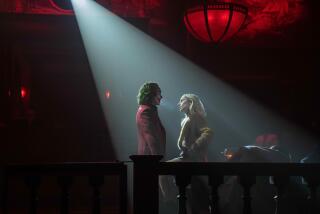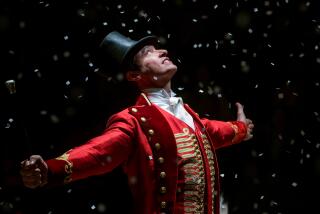The car drives the musical
- Share via
London — A very un-British thing happens during the finale of the West End musical “Chitty Chitty Bang Bang.” Everyone in the London Palladium stands up and, with no discernible prompting from the stage, begins to clap in time and sing: “Chitty Chitty Bang Bang, we love you!”
“It happened from the very first preview,” said Nichola McAuliffe, who plays the wicked Baroness Bomburst in this $10-million adaptation of the 1968 movie. “We assumed it was a lot of Americans.”
Nope, not yet. Right now it’s largely the British, who, in a climate of depressed international tourism, made the upbeat and flashy “Chitty Chitty Bang Bang” a box-office record breaker at the 2,300-seat Palladium, where it’s been playing to full houses since opening in April. It’s probably only a matter of time until “Chitty” -- the story of a flying car and its caretakers -- turns its red-and-gold wings toward Broadway.
Though a stage version of a story about a flying car might seem an unlikely choice, the fusion of spectacle and nostalgia was a powerful draw. “Chitty” has sold more tickets in advance of its opening than any other show in West End history, according to its producers.
Singer Michael Ball, who created the role of Marius in “Les Miserables” but works mostly in concert settings, stars as Caractacus Potts. Also in the West End cast are Olivier Award winners Anton Rogers as Grandpa Potts and Edward Petherbridge as the Toymaker and Brian Blessed as Baron Bomburst. The Childcatcher was originated by Richard O’Brien of “Rocky Horror Show” fame and is being played through Dec. 7 by Paul O’Grady, who is perhaps better known as his drag alter ego Lily Savage.
When reviews came in, they were mixed, though generally good for many critics not known for their kindness toward musical comedies. Alistair Macaulay of the Financial Times actually kicked off his review, “I am bewildered by how much I love the new stage version of ‘Chitty Chitty Bang Bang,’ ” though it struck the Daily Telegraph’s Charles Spencer as “a show with a big budget where its heart should be.”
But they all agreed on one thing: the car. The car soars.
Adventure and whimsy
The film, which starred Dick Van Dyke as goofy inventor Caractacus Potts, has proven remarkably durable, despite an undeniable weirdness and a roster of not particularly memorable songs. The original story came from Ian Fleming, who wrote it for his son. Cubby Broccoli, who had acquired the rights to Fleming’s 14 James Bond novels as well as “Chitty Chitty Bang Bang,” took a break from the spy film series to produce the film musical.
“How on Earth Cubby Broccoli saw in that novel that it would make a great musical I’ll never know,” said Adrian Noble, who directed the London production. “He brought Roald Dahl on board, which I’ve always thought was a really inspired piece of producing.”
Dahl would infuse the “Chitty” movie with the same qualities found in his own work, most prominently “Charlie and the Chocolate Factory”: children on a fantastic adventure, whimsical machines and disturbingly dark overtones. The villains, Baron and Baroness Bomburst, rule the fictional European country Vulgaria, where they have outlawed children and have them rounded up nightly by their sinister henchman, the Childcatcher.
Jeremy Sams, who was commissioned by the Broccolis to adapt the movie into a stage musical in the late 1990s, remembered being struck by the rawness of that allegory when he watched the film again.
“It’s interesting how those Holocaust overtones in the early ‘60s were totally undigested, when people were still alive who went through it but weren’t writing or talking about it.... It was just absolutely in the zeitgeist. They might not have even noticed. And it’s really horrible, that Childcatcher. He doesn’t say he kills the children, but he makes them disappear.”
Overlying the whole adventure of finding, fixing and flying “our fine four-fendered friend” are melodies by Richard M. Sherman and Robert B. Sherman -- the Oscar-winning songwriters behind “Mary Poppins” and one of the most widely translated songs on Earth, “It’s a Small World (After All).” The Sherman brothers also wrote songs for many of Walt Disney’s best-known children’s films of the 1960s, including “The Jungle Book.”
To see the fusion of these elements, consider Caractacus’ love interest. Her name is absolute Ian Fleming: Truly Scrumptious. Her family owns an elaborate candy factory (ahem, Roald Dahl), and she leads the ensemble in a relentlessly upbeat Sherman Brothers anthem to the candy stick flute. (“A bonbon to blow on at last has been found!”)
“The original is a very strange film. I think they were all on drugs,” Sams said. “It’s astonishing. Psychedelic. It’s Roald Dahl. Questions that one asks about story were not asked in any way. Things just happened, and then if they were too incredible, they just became dream sequences.”
None of that would wash in a big-budget West End musical. Sams, first on his own and then with director Noble, would have to rebuild “Chitty” in such a way that it looked familiar but was a more comfortable theatrical ride. Always, all involved knew “Chitty Chitty Bang Bang” had to fly right off the stage.
Actually, it couldn’t just fly, said Noble. It had to be awe-inspiring. It had to be better than the movie. “If it wasn’t going to be that, then what’s the point?”
Aimed at young people
It was around November 2000 when Noble, artistic director of the Royal Shakespeare Company for 12 years, signed on to direct. Noble was in the midst of a major overhaul of the RSC, changing the entire operational structure, altering actors’ contracts and pushing a plan to demolish and replace the Royal Shakespeare Theater in Stratford-upon-Avon. Some members of the theater press in London were harshly critical of everything: his ideas, the execution, his sabbatical to direct “Chitty,” his failure to make the RSC a producing partner.
Consensus among the “Chitty” crew is that Noble was exactly right for this project. Actress McAuliffe, who worked with Noble before on “The King and I,” remarked that it was his diplomacy as much as his intelligence that were needed. “What’s necessary is to bring all the departments and elements together. You need a strength of character that is warm inside a velvet glove.”
(Noble announced last April, shortly after “Chitty” debuted, that he would step down from the RSC when his contract ends in March 2003.)
“I saw it as an opportunity to create something that was very special ... on the one hand to use modern technology, but on the other hand, [it] was a warm story with vivid characters and lovely, lovely melodies,” Noble said. “When young people go to the theater for the first time, we have the responsibility to delight them in a really special way. We want them to come back and back.”
During June 2001, Noble, Sams and the Sherman brothers gathered in the den at the Los Angeles home of Barbara Broccoli (Cubby’s daughter, who now produces the James Bond films) and her husband, Frederick Zollo, also a theater and movie producer. They bounced around ideas for scenes and new songs. When one of them said, for instance, “It takes teamwork to make a dream work,” Sams commented that that would make a great song. And the Shermans just wrote it.
“It was like something out of a Mickey Rooney movie,” Zollo said. In addition to rearranging scenes and resurrecting songs cut from the film, the Sherman brothers wrote four new songs that were added to Act 2.
“One of the real treats was watching these guys write a hit song,” Noble said. “They quite literally created it before our eyes. Sometimes they’d write a number and I’d say it doesn’t quite work, and they’d just say, ‘OK,’ and try again.”
Making Chitty fly
Back in England, the nuts and bolts of making Chitty fly were getting sorted out in a warehouse in Norfolk, where designer Anthony Ward was halfway through developing the flying car. It would eventually take nearly a year to perfect the mechanism that launches Chitty up off the stage, out past the orchestra pit and dips the car over the first two rows of seats -- to immediate and irrepressible applause at the end of Act 1.
Everyone involved deftly avoids spelling out exactly how Chitty defies gravity. The mechanics that fly the car through the air, and the lighting that makes it so convincing, however, are only part of what makes the stunt work. The rest of the magic is supplied by an auditorium full of expectation.
“Of course it doesn’t fly, it’s a simple theatrical device,” Sams said. “But by the end of Act 1, we know and love the character of the car and the people in it. And they’re in mortal danger, and the only way they can escape is for the car to fly, so we will it up there. Nobody is really looking for the mechanism that makes it so. Why would they? We the audience are actually making it so.”
The flying Chitty Chitty Bang Bang (which, by the way, has seat belts for up to five passengers) is but one of the stunts that make the musical a full-fledged spectacle. There’s also a chorus of 34, not including dozens of children, miniature cars and zeppelins, and some 20 trained dogs.
The producers come from the can-do culture of film. And not just any movies, James Bond movies. They don’t easily accept that a stunt can’t be done. When, for instance, Barbara Broccoli suggested that the Childcatcher be caught in a net and hoisted through the top of the theater’s ceiling -- more than 100 feet up -- the initial reaction was no, you can’t do that. “She was quiet for about 20 seconds,” Sams recalled, “and then they said, ‘Well ... we could have a go.’ ”
Zollo is confident that within a year “Chitty Chitty Bang Bang” will have found a spot to park on Broadway.
And while a New York version could cost up to $20 million to stage -- rivaling the $25-million budget of “The Lion King” -- Broadway tickets sell for more than those on the West End, where tickets top out at 40 pounds, about $65. The Broadway hit “The Producers,” by contrast, has a top ticket price of $100.
They’re in early talks with theaters, hoping to find a space that, like the 2,300-seat Palladium, is big enough for “Chitty” to spread its wings. In the right setting, Chitty could fly out even farther over the audience and do a few other yet-unused maneuvers.
“It’s fantastic,” Noble said. “I tell you, we could just sell rides.”
*
What we said then
“There’s singing, dancing, some ingratiating people and all manner of visual delight, but this fantasy about the adventures of an eccentric inventor (Dick Van Dyke) and his magical automobile too often huffs and puffs when it should be chugging along.
“In short, it suffers from all the chronic ailments of blockbusters: It’s too long, the production numbers are so lavish and numerous they begin to cancel each other out, and the songs, though pleasantly functional, are not really memorable.
“So much for the drawbacks. None of them is likely to faze the children for which this film is a natural or those adults who prefer Disney-type entertainment. Indeed, among the year-end deluge of films it is one of the very few suitable for kids and appropriate to the holiday season.” -- Kevin Thomas, Los Angeles Times, Dec. 18, 1968, on the film “Chitty Chitty Bang Bang”
More to Read
The biggest entertainment stories
Get our big stories about Hollywood, film, television, music, arts, culture and more right in your inbox as soon as they publish.
You may occasionally receive promotional content from the Los Angeles Times.










